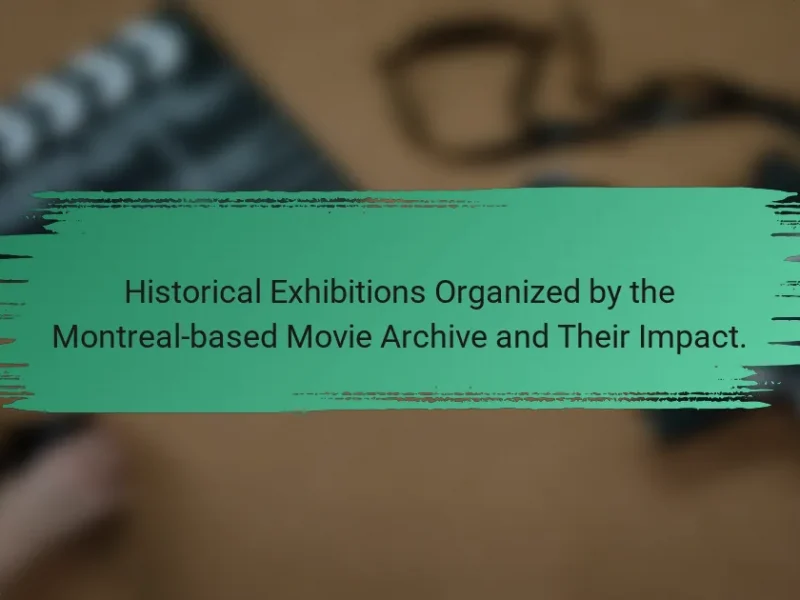The Montreal-based Movie Archive is a film preservation organization dedicated to collecting and archiving films that reflect Quebec’s cultural and historical narratives. It serves as a vital resource for researchers, filmmakers, and the public, aiming to safeguard Quebecois cinematic heritage for future generations. The Archive promotes local filmmakers, facilitates access to its collections through screenings and exhibitions, and organizes educational programs to engage the community with Quebec’s film history. However, it faces challenges such as funding limitations, digitization issues, competition for resources, and complex copyright laws, which impact its ability to effectively document and preserve Quebecois history.

What is the Montreal-based Movie Archive?
The Montreal-based Movie Archive is a film preservation organization. It focuses on collecting and archiving films that document Quebec’s cultural and historical narratives. The archive serves as a resource for researchers, filmmakers, and the public. It aims to safeguard Quebecois cinematic heritage for future generations. Established in Montreal, it plays a crucial role in promoting local filmmakers. The organization also facilitates access to its collections through screenings and exhibitions. This initiative helps raise awareness of Quebec’s diverse film history.
How was the Montreal-based Movie Archive established?
The Montreal-based Movie Archive was established in 1963. It was founded by a group of film enthusiasts and historians. Their goal was to preserve Quebec’s cinematic heritage. The archive aimed to collect and restore films that reflected the province’s culture and history. Over the years, it has grown to include a vast collection of films. This collection documents significant events and social changes in Quebec. The archive plays a crucial role in research and education. It serves as a resource for filmmakers and historians alike.
What were the initial goals of the Montreal-based Movie Archive?
The initial goals of the Montreal-based Movie Archive included preserving Quebec’s film heritage. The archive aimed to collect and safeguard films that reflect the cultural identity of Quebec. It sought to provide access to these films for research and educational purposes. Additionally, the archive intended to promote awareness of Quebec’s cinematic contributions. By documenting local history through film, the archive aimed to support cultural preservation efforts. These goals were essential for fostering a deeper understanding of Quebecois culture and history.
Who were the key figures involved in its founding?
The key figures involved in the founding of the Montreal-based Movie Archive include its founder, Pierre Perrault. He was instrumental in establishing the archive to preserve Quebecois cinema. Other notable figures include Claude Jutra, a prominent filmmaker who contributed to the early collection efforts. Additionally, the involvement of various film historians helped shape the archive’s mission. Their collective efforts aimed to document and celebrate Quebec’s cultural heritage through film.
What role does the Montreal-based Movie Archive play in documenting history?
The Montreal-based Movie Archive plays a crucial role in documenting history by preserving audiovisual materials. It collects and archives films that reflect Quebec’s cultural and social evolution. The archive serves as a resource for researchers, filmmakers, and the public. It provides access to historical footage that captures important events and everyday life in Quebec. By digitizing and cataloging these materials, the archive ensures their longevity. This preservation contributes to the understanding of Quebecois identity and heritage. The archive also engages in educational initiatives that promote awareness of historical narratives through film.
How does the archive collect and preserve Quebecois films?
The archive collects Quebecois films through systematic acquisition and preservation methods. It actively seeks films from various sources, including filmmakers, production companies, and private collections. The archive evaluates films for historical significance and cultural value before acquisition. Once collected, films undergo preservation processes to maintain their condition. This includes digitization to protect against deterioration. The archive also implements proper storage techniques to ensure longevity. Regular assessments are conducted to monitor the condition of the films. These practices help safeguard Quebecois cinematic heritage for future generations.
What types of films are included in the Montreal-based Movie Archive?
The Montreal-based Movie Archive includes a variety of film types. These types encompass feature films, documentaries, and short films. The archive focuses on films that represent Quebec’s cultural and historical narratives. It also includes films that reflect the diversity of Quebecois society. Many films in the archive are produced by local filmmakers. The collection aims to preserve and showcase Quebec’s cinematic heritage. Documentaries in the archive often explore social and political themes relevant to Quebec. Overall, the archive serves as a crucial resource for studying Quebecois history through film.

How does the Montreal-based Movie Archive contribute to Quebecois culture?
The Montreal-based Movie Archive contributes to Quebecois culture by preserving and showcasing the region’s cinematic heritage. It collects films that reflect the unique narratives and experiences of Quebec. The archive provides access to historical films that document significant cultural events. It supports filmmakers by offering resources and promoting local talent. Educational programs are organized to engage the community with Quebec’s film history. The archive collaborates with cultural institutions to enhance awareness of Quebecois cinema. These efforts foster a deeper understanding of Quebec’s identity and artistic expression. By maintaining a comprehensive collection, the archive plays a vital role in cultural preservation.
Why is the preservation of Quebecois cinema important?
The preservation of Quebecois cinema is important for cultural identity. Quebecois films reflect the unique history, language, and values of Quebec society. They serve as a record of the region’s evolution and artistic expression. Documenting this cinema helps maintain a connection to the past. It also fosters a sense of pride among the Quebecois people. Furthermore, preserved films can educate future generations about their heritage. The Montreal-based Movie Archive plays a crucial role in this preservation effort. It ensures that these films remain accessible for research and enjoyment.
What cultural narratives are captured through the archive’s collections?
The archive’s collections capture various cultural narratives of Quebec’s history. They document the evolution of Quebecois identity through film. The films reflect social, political, and economic changes in the region. They showcase the perspectives of different communities within Quebec. The archive includes works that highlight indigenous narratives and contributions. It also features stories of immigration and multiculturalism in Quebec. Historical events such as the Quiet Revolution are represented through visual storytelling. Overall, the collection serves as a vital resource for understanding Quebec’s diverse cultural landscape.
How does the archive support local filmmakers and artists?
The archive supports local filmmakers and artists by providing access to historical film materials. It offers resources that help in research and creative development. Filmmakers can reference archived films to inspire their projects. The archive also hosts workshops and events that promote networking among local talent. Additionally, it collaborates with artists for exhibitions showcasing their work. This initiative fosters a community that values and preserves Quebecois culture. By doing so, the archive strengthens the local film ecosystem and encourages new storytelling.
What impact does the Montreal-based Movie Archive have on education and research?
The Montreal-based Movie Archive significantly impacts education and research by providing access to a vast collection of films and audiovisual materials. This archive serves as a primary resource for scholars studying Quebecois history and culture. It enhances educational programs by offering primary sources that illustrate historical events and social movements. Researchers utilize the archive to analyze film as a cultural artifact, contributing to various academic fields such as media studies, history, and sociology. The availability of digitized content facilitates remote access for students and researchers worldwide. Additionally, the archive hosts workshops and educational initiatives that promote film literacy and historical understanding. These efforts foster a deeper appreciation of Quebec’s cinematic heritage among new generations.
How do educators utilize the archive’s resources?
Educators utilize the archive’s resources to enhance their curriculum and provide students with primary historical materials. They access films, documents, and photographs that reflect Quebecois culture and history. These resources serve as teaching tools in classrooms, allowing for interactive learning experiences. Educators incorporate the archive’s materials into lessons on media literacy and historical analysis. They also encourage students to engage with the content critically. Furthermore, the archive’s resources support research projects and presentations. By utilizing these materials, educators foster a deeper understanding of Quebec’s heritage among students.
What research opportunities does the archive provide for scholars?
The archive provides scholars with access to a vast collection of audiovisual materials. This collection includes films, documentaries, and recordings that reflect Quebecois culture and history. Scholars can analyze these materials to understand social, political, and artistic movements in Quebec. The archive also offers digitized resources for remote access, facilitating research from various locations. Additionally, it hosts workshops and seminars that promote collaboration among researchers. These opportunities enhance scholarly discourse and foster new insights into Quebecois heritage. Overall, the archive serves as a vital resource for historical research and cultural studies.

What challenges does the Montreal-based Movie Archive face in its mission?
The Montreal-based Movie Archive faces challenges related to funding and resource allocation. Limited financial support affects its ability to acquire and preserve films. The Archive also struggles with the digitization of older formats. Aging technology complicates the preservation of historical films. Additionally, there is competition for attention and resources from other cultural institutions. This competition can dilute the Archive’s visibility and impact. The Archive must also navigate the complexities of copyright laws. These legal challenges can hinder access to certain films. Overall, these factors collectively impede the Archive’s mission to document Quebecois history effectively.
How does funding affect the operations of the Montreal-based Movie Archive?
Funding directly impacts the operations of the Montreal-based Movie Archive. Sufficient funding allows for the acquisition of new films and preservation of existing collections. It enables the Archive to maintain and upgrade its facilities and technology. Increased financial resources support staff salaries and training, enhancing operational efficiency. Funding also facilitates community outreach and educational programs. Grants and donations are critical for sustaining these initiatives. For example, government support has historically played a significant role in the Archive’s growth. Without adequate funding, the Archive’s ability to document and preserve Quebecois history would be severely limited.
What strategies are in place to secure funding and support?
The Montreal-based Movie Archive employs various strategies to secure funding and support. These include grant applications to government bodies and cultural organizations. The Archive also seeks partnerships with educational institutions for collaborative projects. Fundraising events and community outreach initiatives are organized to engage local stakeholders. Additionally, the Archive actively cultivates relationships with private donors and sponsors. By showcasing its impact on preserving Quebecois history, the Archive enhances its appeal for funding. Such strategies have proven effective in maintaining financial sustainability and support for its mission.
How does the archive address technological changes in film preservation?
The archive addresses technological changes in film preservation by adopting digital restoration techniques. These techniques enhance the quality of aging films and ensure their longevity. The archive utilizes advanced scanning technology to digitize film reels. This process captures high-resolution images and sound, preserving original content. Additionally, the archive implements software for color correction and image stabilization. These tools restore films to their intended appearance. The archive also collaborates with technology experts to stay updated on emerging preservation methods. This proactive approach ensures that the films remain accessible for future generations.
What future developments are anticipated for the Montreal-based Movie Archive?
Future developments anticipated for the Montreal-based Movie Archive include the expansion of its digital collection. This expansion aims to increase accessibility to historical films. The archive plans to collaborate with local filmmakers to enhance its catalog. Additionally, there is a focus on improving preservation techniques for older films. The archive also intends to host educational programs and workshops. These initiatives will engage the community and promote Quebecois cinema. Funding from government grants is expected to support these projects. Overall, these developments aim to strengthen the archive’s role in documenting Quebecois history.
How might the archive expand its collections in the coming years?
The archive might expand its collections by actively seeking new acquisitions. This includes collaborating with local filmmakers and institutions. Engaging with the community can uncover untapped historical footage. The archive may also digitize existing collections to enhance accessibility. Utilizing social media platforms can attract contributions from the public. Hosting events can raise awareness and encourage donations. Additionally, applying for grants can provide funding for expansion efforts. These strategies will help the archive grow its diverse collection of Quebecois history.
What initiatives are planned to engage the community further?
The Montreal-based Movie Archive plans several initiatives to engage the community further. These initiatives include hosting film screenings that feature Quebecois history. Workshops will be organized to educate the public on archival practices. Community discussions will be facilitated to encourage dialogue about local history. Collaborations with schools are planned to integrate film into educational programs. The archive will also develop online resources for wider accessibility. These efforts aim to foster a deeper connection between the community and its historical narratives.
What can individuals do to support the Montreal-based Movie Archive?
Individuals can support the Montreal-based Movie Archive by donating funds. Financial contributions help maintain and expand the archive’s collections. Volunteering time also benefits the archive. Volunteers can assist with cataloging and organizing films. Additionally, individuals can promote the archive through social media. Raising awareness increases public interest and engagement. Attending events hosted by the archive supports its mission. Participation in screenings fosters community involvement. Finally, individuals can become members to receive updates and exclusive content. Membership provides ongoing support to the archive’s activities.
How can community members get involved with the archive?
Community members can get involved with the archive by participating in volunteer programs. These programs often include tasks such as cataloging films and assisting with events. Members can also attend workshops hosted by the archive to learn more about film preservation. Additionally, community members can contribute personal stories or materials related to Quebecois history. Engaging in discussions and providing feedback during public events helps shape the archive’s future initiatives. The archive regularly announces opportunities through its website and social media channels. This involvement fosters a collaborative environment that enriches the preservation of Quebecois culture and history.
What are effective ways to promote awareness of the archive’s work?
Utilizing social media platforms is an effective way to promote awareness of the archive’s work. Engaging content can reach a wider audience. Hosting community events can also raise local awareness. Collaborating with educational institutions enhances visibility. Creating informative newsletters keeps stakeholders informed. Developing partnerships with local media can amplify outreach. Offering guided tours showcases the archive’s resources. Utilizing online databases makes information easily accessible. Each of these strategies contributes to increased public engagement with the archive’s mission.
The Montreal-based Movie Archive is a film preservation organization dedicated to collecting and archiving films that document Quebec’s cultural and historical narratives. Established in 1963, it plays a crucial role in safeguarding Quebecois cinematic heritage and promoting local filmmakers through access to its collections, screenings, and educational initiatives. The archive faces challenges such as funding and technological changes but continues to support education and research, enhance community engagement, and expand its collections to ensure the preservation of Quebec’s diverse film history.


